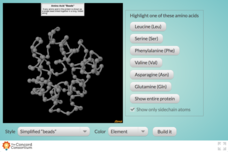Santa Monica College
Lewis Structures and Molecular Shapes
Learners practice drawing Lewis dot structures, build molecules with model kits, and predict molecular shapes using VSEPR theory. The combination of written work and hands-on reinforcement benefits young scientists.
Concord Consortium
Exploring Protein 3D Structure
Presenting protein structure can be difficult! Take young biologists on a 3-D amino acid adventure with a detailed interactive. Pupils view and manipulate common amino acids individually or as a part of a whole protein. Choose from three...
Concord Consortium
Polarization
This is one cool resource for teaching about polarity! Chemistry scholars observe electron distribution and molecular shape as they select different non-metals and form bonds. The interactive offers two views, surface charge and electron...
Concord Consortium
Factors Affecting London Dispersion Attractions
How can non-polar molecules be attracted to one another? Introduce the phenomenon of London dispersion forces to young chemists through an entertaining interactive. Pupils choose from a variety of molecular shape combinations, then pull...
Concord Consortium
Electron Geometry
It's time to whip your chemistry class into shape! Begin your study of molecular geometry with a colorful, 3-D interactive. The resource shows models of linear, trigonal planar, and tetrahedral molecules.
Concord Consortium
Exploring Hydrophobic Core
How do the hydrophobic and hydrophilic regions of a protein affect its shape? Science scholars explore the molecular properties of protein molecules using a detailed interactive. The resource allows the user to rotate the protein, view...
Towson University
Mystery of the Crooked Cell
Can your class solve the Mystery of the Crooked Cell? Junior geneticists collaborate to learn about sickle cell anemia in a fascinating lesson plan. The included materials help them to examine the genetic factors behind the disease...
Concord Consortium
Concord Consortium: Molecular View of a Liquid
This simulation allows students to make observations about the structure and movement of particles in a liquid.
Concord Consortium
Concord Consortium: Elements and Polarity
Explore how polarity affects molecular shape and charge.
Concord Consortium
Concord Consortium: Protein Folding
Generate all polar, all nonpolar, or random proteins and observe how the protein folds in response to these molecular properties. Explore how the potential energy of the system changes over time to draw conclusions about how proteins...







